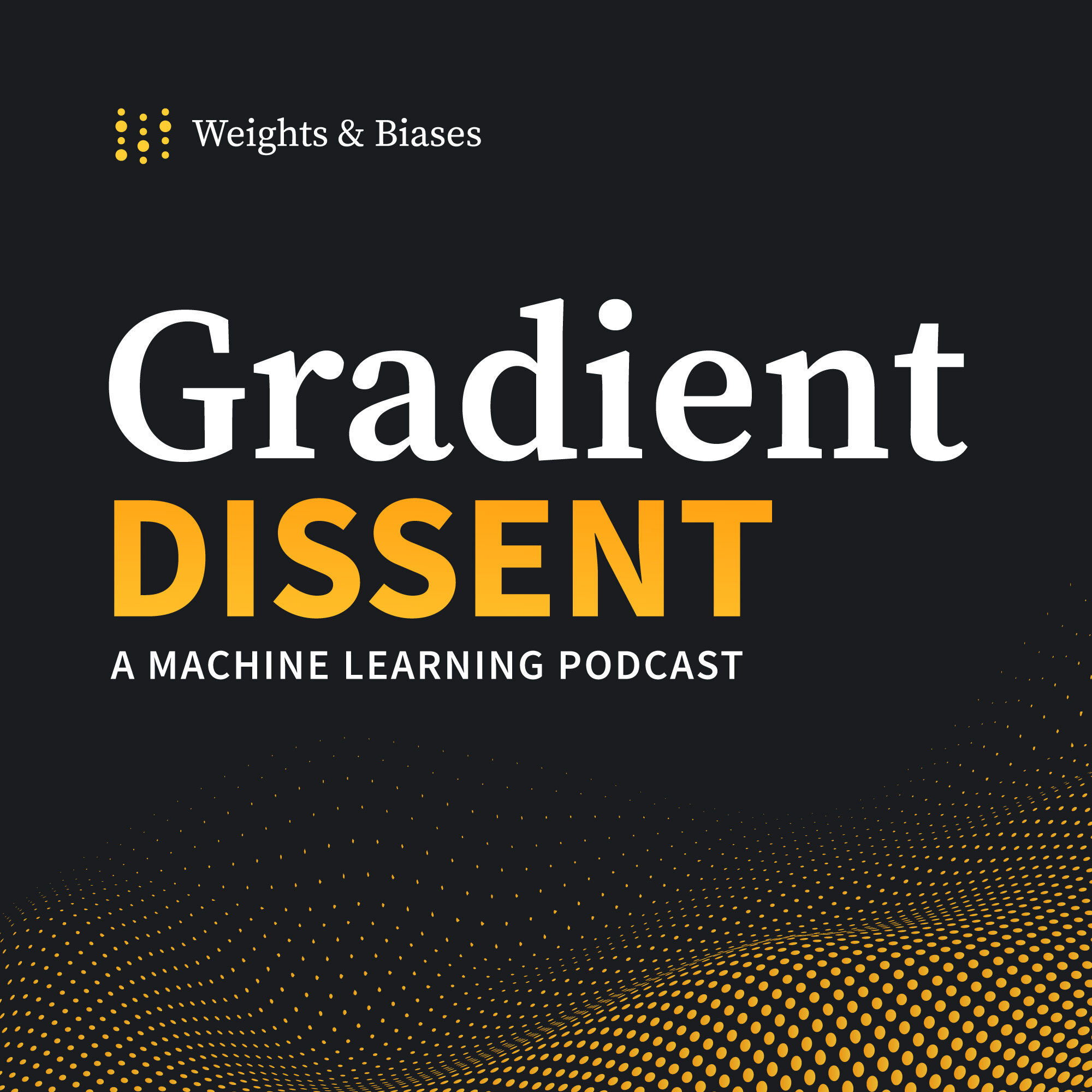

Gradient Dissent: Conversations on AI
Lukas Biewald
Join Lukas Biewald on Gradient Dissent, an AI-focused podcast brought to you by Weights & Biases. Dive into fascinating conversations with industry giants from NVIDIA, Meta, Google, Lyft, OpenAI, and more. Explore the cutting-edge of AI and learn the intricacies of bringing models into production.
Episodes
Mentioned books

27 snips
Apr 25, 2024 • 1h 10min
Accelerating drug discovery with AI: Insights from Isomorphic Labs
Max Jaderberg and Sergei Yakneen from Isomorphic Labs discuss AI in drug discovery, focusing on deep learning advancements, evolving AI models for drug design, input granularity in NLP and biology data, overlaps in material science and biology, the role of diverse datasets in AI-driven drug discovery, and machine learning applications in neuroscience.

Apr 11, 2024 • 53min
Redefining AI Hardware for Enterprise with SambaNova’s Rodrigo Liang
CEO Rodrigo Liang of SambaNova Systems discusses the importance of specialized AI hardware for enterprises, navigating challenges of AI adoption, AI applications in large corporations, and the future of AI in the business world.

19 snips
Mar 28, 2024 • 1h 6min
Navigating the Vector Database Landscape with Pinecone's Edo Liberty
Former leader at Amazon AI Labs and Yahoo's New York lab, Edo Liberty, talks about Pinecone's vector database technology. They discuss challenges in VDB tech, unique approaches, future trends, and leadership philosophy. Explore evolving AI technologies, efficient vector search techniques, database efficiency optimization, and tradeoffs in database systems. Insights on AI startup success using vector databases.

11 snips
Mar 14, 2024 • 58min
Transforming Data into Business Solutions with Salesforce AI CEO, Clara Shih
Explore the impact of AI in various industries with Salesforce AI CEO, Clara Shih. Learn about Salesforce's cutting-edge approach to customer service, the future of AI policies and education, and innovative AI tools like Prompt Builder and Copilot Studio. Dive into discussions on team structures, AI adoption in companies, language models in CRM, and hybrid search setups. Discover insights on data cloud connectivity, model optimization, customer preferences on open source vs. proprietary models, and embracing change in the tech industry. Exciting product announcements for Salesforce users to personalize generative AI use cases and enhance data interactions.

24 snips
Feb 29, 2024 • 1h 4min
Upgrading Your Health: Navigating AI's Future In Healthcare with John Halamka of Mayo Clinic Platform
Explore the revolutionary intersection of AI and Healthcare with John Halamka of Mayo Clinic. Delve into AI's evolution in modern medicine, Mayo Clinic's visionary work, and the ethical frameworks guiding its application. Discover AI's potential to democratize healthcare globally and the challenges and triumphs on the horizon.

Feb 15, 2024 • 54min
Shaping the World of Robotics with Chelsea Finn
In this episode of Gradient Dissent, Chelsea Finn, Assistant Professor at Stanford's Computer Science Department, discusses the forefront of robotics and machine learning. Topics include two-armed robots learning to cook shrimp, the challenges of developing humanoid and quadruped robots, the limitations of simulated environments, and the future of household robotics. She also talks about her work on student feedback in education and the impact of AI coding tools on computer science education.

18 snips
Feb 1, 2024 • 1h 8min
The Power of AI in Search with You.com's Richard Socher
Richard Socher, CEO of You.com, discusses the power of AI in search and the transformation of search engines with advanced language models like GPT-4. He explores the practical applications and challenges of integrating AI into search functionality and the ethical considerations and future implications of AI in our digital lives. They also touch on the role of AI in automating and transforming digital work, as well as envisioning the future of AI in daily life and work.

17 snips
Jan 18, 2024 • 1h 4min
AI’s Future: Investment & Impact with Sarah Guo and Elad Gil
Join Sarah Guo and Elad Gil on a deep dive into the world of AI, exploring topics such as fine-tuning versus RAG in AI, evaluating AI research for investment, the impact of AI models on product development, AI's role in evolving job markets, code generation technologies in software engineering, AI's broader industry implications, importance of product-driven approaches in AI startups, AI's impact on traditional roles and industries.

10 snips
Jan 4, 2024 • 58min
Revolutionizing AI Data Management with Jerry Liu, CEO of LlamaIndex
Jerry Liu, CEO of LlamaIndex, discusses the integration of diverse data formats with AI technologies, addressing challenges in data retrieval, analysis, and conversational memory. They explore topics such as Retrieval Augmented Generation (RAG), vector databases, AI model hallucinations, text extraction applications, and the role of LlamaIndex in the rapidly evolving field of AI-driven systems.

Dec 7, 2023 • 1h 15min
Bridging AI and Science: The Impact of Machine Learning on Material Innovation with Joe Spisak of Meta
Joe Spisak, Product Director, Generative AI @Meta, discusses the influence of AI models like GPT and Llama2 on user experiences, as well as their contributions to fields like biology and material science. The podcast also explores AI's practical business applications and the significance of open-source AI development and collaboration.


